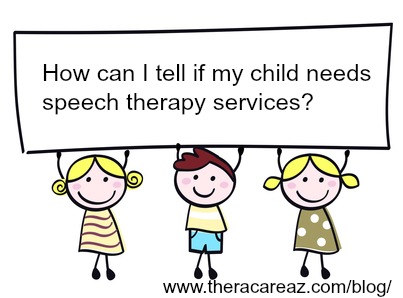
- I often get asked questions from friends, family, (and sometimes even strangers once they learn what I do for a living) about if I think they should seek out speech therapy for their child. As parents, we want to do our best and make sure our children are getting everything they need, but that is hard to do if we aren’t sure they need something to begin with.Children who are school aged, will be referred for speech therapy services by their teacher, who then informs the school SLP, who then sends a notice home to parents. However, if your child is homeschooled, participates in online school, or in a private school that does not offer therapy, there is no outside teacher to refer. If your child is under school age, you may have concerns based on how that child is doing compared to an older (or younger sibling) or other same-aged children you know. When younger children are taken to their pediatric well check visits, a thorough pediatrician asks questions about their speech/language/social development which helps them determine if a referral for speech therapy is necessary. However, annual well checks are just that…annual, and a lot can happen (or not be happening) with a child’s developmental and speech/language skills in that 12 month in between appointments. Here are a few tips to help you decide if seeking out a speech therapy consult or evaluation may be necessary.
Your child is not meeting speech/language milestones. There are many blog posts and lists that share what a child should be doing at each age. The one I prefer to refer parents to for children birth to age 5 is this one from the American Speech Hearing Association. Educating yourself on developmental norms can help you make an informed decision on if you feel a speech language consult or evaluation is needed or not needed.
Your child is verbal but is only understood by family or familiar listeners. The general guideline is your child’s age divided by 4 and turned into a percentage is the amount of their speech that should be understandable by an unfamiliar listener: 1 yr old-25%, 2 yr old-50%, 3 yr old-75% and 4 yr old 100% (Coplan & Gleason, 1988; Flipsen, 2006). Speech sound errors in and of themselves are not always a sign that speech therapy is needed. For example, you may be concerned that your 4 yr old cannot say /R/ when their siblings all could at that age. However, 4 year olds are not expected to have this particular speech sound yet (although many do). You can refer to the ASHA checklists referred above which also tell which sounds are due at which ages. Most speech therapists will determine if speech therapy is needed for speech sound errors based on the Iowa Nebraska Articulation norms and to what degree your child’s speech sound errors are negatively impacting their ability to effectively communicate.
Your child has limited interest in social interaction or avoids eye contact.
Your older child is interested in social interaction but has difficulty being socially appropriate (making/maintaining friendships, commenting appropriately, holding their side of a conversation, etc).
Your child does not play with toys appropriately. For example, lines up all of his cars instead of pushing them back and forth pretending they are a car.
Your child stutters or is exhibiting periods of stuttering. Stuttering is a time sensitive speech disorder. Children who begin therapy for stuttering prior to age 7-8, can with successful therapy, remediate their stuttering completely and have fluent speech going forward without conscious effort. Children who begin stuttering therapy past the age of 8, while they can also achieve fluency, may or may not have to actively incorporate the strategies they learn in therapy to stay fluent even as adults. While some children will go through what is considered “normal” periods of disfluency which is usually due to a fast and large increase in expressive language skills/vocabulary within a short time period, it is best to consult with a speech language pathologist to be sure.
Your child is an extremely picky eater, avoids certain food textures, or has difficulty swallowing. If you suspect your child has any concerns in this area, contact your child’s primary care physician immediately for a referral. Depending on your state, you may be referred to an SLP or an OT to address your child’s feeding/swallowing issues.
Your child falls into a higher risk group. Children who have had multiple ear infections, prolonged hospital stays, were preemies, or have other medical conditions are at higher risk for needing speech/language therapy services.
While this is not a comprehensive list (the area of speech/language pathology is vast and can include (but not limited to) the areas of speech, articulation (how sounds are produced) expressive language (what is said), receptive language (what is understood), swallowing disorders, oral motor weakness (when is excessive drool just excessive drool and when is it a problem needing therapy? An SLP will know), social skills, play skills (0-3 yrs), stuttering, social skills, reading concerns, written language, and more), I hope this post is helpful as you determine if speech therapy is something you want to seek out for your child.

 Katie Sullivan, M.S., SLP-CCC has been a pediatric Speech Language Pathologist for 22 years, and is a Therapy Supervisor with Theracare. She is the mother to five children, ages 7-17, including twin teenage sons with special needs. You can follow her at the My Sweet Homeschool blog, facebook, twitter, and instagram.
Katie Sullivan, M.S., SLP-CCC has been a pediatric Speech Language Pathologist for 22 years, and is a Therapy Supervisor with Theracare. She is the mother to five children, ages 7-17, including twin teenage sons with special needs. You can follow her at the My Sweet Homeschool blog, facebook, twitter, and instagram.





